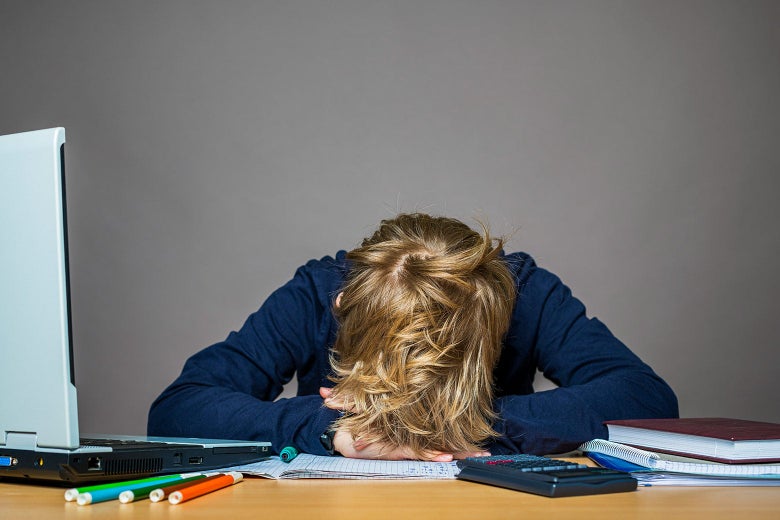Online school: An ineffective form of education
December 10, 2020
Because of the coronavirus pandemic, schools all across the world have been forced to shut down and switch to an online setting. It is vital for children and teens to continue their education, even during these difficult times, but the real issue is whether or not online school is effective. Unfortunately, many students are not learning much of anything when they are learning remotely.
New York City went into lockdown in March, and online schooling started a little over a week after. Most schools utilize the video conferencing app Zoom for online lessons. During this time, there were many security issues that disrupted online classes all over the world.
“I had a couple of ‘Zoom bombs’ at the very beginning of 4th quarter when new classes were starting and it was hard to tell from login names who belonged and who didn’t. It was disturbing to think that people would go out of their way to disrupt a class in the middle of what was already such a stressful time,” Ms. Turso, a teacher at the iSchool said.
Although schools have managed to sort out the logistics by now, the system is nowhere near perfect. Many students have a hard time concentrating during Zoom lessons, and is harder to engage during class, for both teachers and students, through the barrier of a screen. One-on-one help is harder to receive; in person, a student could simply raise their hand and the teacher would come over and help with whatever they needed. Now, to get proper one-on-one help, teachers usually have to set up separate Zoom meetings, which is not only inconvenient but also can be anxiety inducing for students.
Lincoln Ahn, a student at Brooklyn Tech, describes how he and his peers have been feeling due to online school. “Even if I had a second set of hands, I couldn’t count the number of people I know who are stressed and anxious on my fingers.”
Attendance has also largely decreased due to this change of environment. When surveying a large sample of students about how they feel about remote learning, Common Sense Media discovered that “a majority of teens (59%)” feel that “online learning is worse than in-person schooling, with 19% characterizing it as ‘much worse’.” This data indicates that students are more likely to be less motivated to participate in online school, therefore explaining the drop in attendance rates. This is exactly what happened once schools transitioned to remote learning. According to the LA School Report, a survey completed by a sample of over 100 teachers found that 55% “of teachers said more than half of their students have not been tuning in to remote classes.”
The issue goes beyond the online lessons themselves. When it comes to completing homework, many students have a difficult time getting their work done. When your work environment suddenly becomes your own bedroom, it is very difficult to be able to concentrate in a place you associate with relaxation rather than work.
“Over the length of quarantine I have felt my concentration go from decent to non-existent,” Lincoln says. “I can barely go 4 minutes without fiddling with something on my cramped desk or getting up to help my family.”
Many people have struggled with their mental health during quarantine. Going from being surrounded from your fellow classmates to being isolated in your own home is a sudden and unpleasant transition.
“Throughout the course of the pandemic, the lines between work and personal issues have been blurred to a concerning degree,” Adam Galland, a student from Westchester County expresses. “When this is coupled with a struggle to find motivation, things begin to seem truly overbearing as there is just as little motivation for school as there is for say, a social problem with friends.”
The pandemic has cut people off from their peers and the environment in which they interact with them. When it comes to school, the social aspect is nearly if not just as important as the academic aspect, and when one of those disappears the other will suffer, and that is exactly what has happened with online learning. “I do miss my friends a lot, we talk all day on the phone but it’s not the same as it was before this pandemic started,” says Angie Grullon, an iSchool junior says.
Unfortunately, there is no definitive solution to the myriad of problems that come with online school. No matter what, nothing can be done to make online school even remotely similar to in person school when it comes to engaging with your peers. Without the essential element of face to face interaction, educating students cannot be as successful. Simply put, online learning just doesn’t really work.
So, what can we do? As ineffective as online learning is, it’s what we’re stuck with for now, and there’s no way around it without putting the public at risk. The best and most important thing we can do right now is provide guidance and assistance for students during these difficult times.
One suggestion on how to improve online schooling was suggested by Sabrina Colon, a junior at the iSchool. “Have a day dedicated to teachers checking in with their students,” “I think it’s important to make sure everyone is doing alright, academically and mentally.”
By making a point of meeting with students to make sure they are coping with the difficulties that come with remote learning, we can hopefully give students a better educational experience and lessen the stress many are feeling during these unprecedented times.


